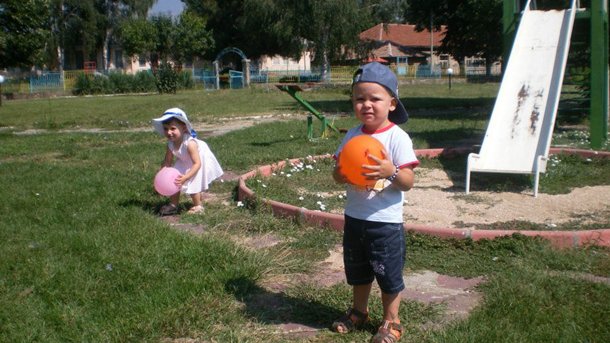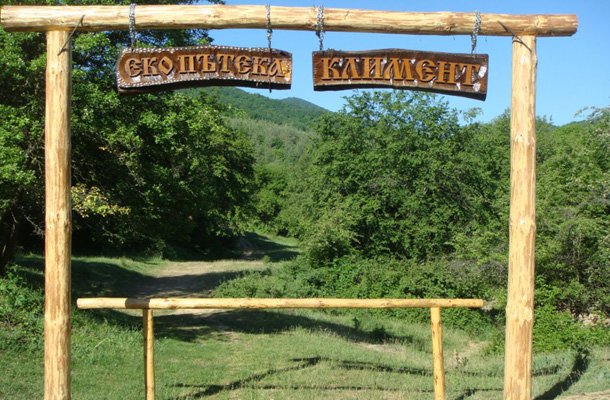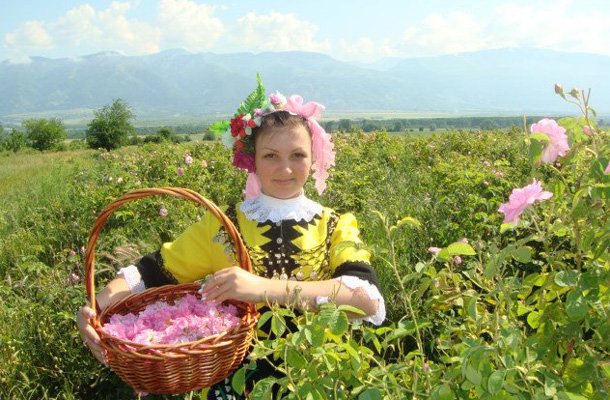The village of Kliment bears the name of the renowned Bulgarian bishop and bookman of the Middle Ages Kliment Ohridski who was one of the students of the Saint Brothers Syril and Methodius who created the Slavonic script. Nestled at the foot of the Sredna Gora Mountain, it is one of the many villages situated in the Rose Valley. The main means of livelihood here, as we can all guess, is the cultivation of oil-yielding rose. The settlement is proud with the fact that the first organic rose oil was produced there.
Unlike most of the Bulgarian villages, whose population amounts to only several hundred people and is constantly melting down, the village of Kliment is among the good exceptions and has a population of over 1000 people. The settlement is among the places which have managed to keep the young people. Why this is so? There are many reasons for that. Firstly, the village has the good luck to lie in the heart of the Rose valley which has been providing lucrative means of living to people from this region. However, the population can not live nowadays only on rose production, says Stefan Todorov who is one of the members of the local rose association entitled “Bio Bulgaria Oil”. Most of the people from the village of Kliment work in the neighboring towns of Karlovo and Sopot and their children study in these settlements. The local school was closed at the end of the 1990’s when the village went through hard times.
“We were on the verge of survival", recalls the village mayor Mano Manov. “Only 1 to 2 children were born in our village during this period. This was the hardest time since 1993 and 1994. We could not keep the school open, provided only several kids were born per year.”

The newly-born last year were much more-18 people. In fact, three of them were three twins, children of the 35 year-old mayor. “However, in some years the number of the born children drops to around 10 and we can not still think of opening out own school”, says Mr. Manov.

The energetic mayor entered the village administration as a secretary when he was only 22 years old. The budget of the village council amounted to only EUR 150 per month during these hard times, a situation one can hardly imagine. Mano himself has contributed a lot to the improvement of this bad situation.
“I was struggling to unite the population and make them think positively, but I managed to do it eventually”, says the village mayor. “Currently, we do not have offices of political parties in the village, which is quite good, because the political confrontation caused hatred and disunited people in the past.”
Mayor Mano Manov does not support any political party and was elected by his fellow citizens to head the village administration as an independent nominee for three mandates so far. The mayor is happy that he manages to motivate the young people to work hard for the well-being of the village.

© Photo: private archive
The village of Kliment has been winning European projects of development on a regular basis, which are fulfilled mainly through the voluntary labor of the local students and youngsters.
“These are projects where nearly all young people from our village take part. They are quite ambitious people and I am very happy with this fact. In May, 2013, we completed a project of the tourist association for the creation of an 18 kilometer long eco-path near village. The young people built many spots for recreation and barbecues along the path. I am quite glad that this place is constantly full of people who go in the nature and take a break from their dull daily round. The village community centre also carried out many projects. We published a book of the village history and another one, containing around 240 folklore songs. All this was done with the labor of volunteers. An average of 20 young people worked over a certain project. These people were working almost non-stop. We provided an office for them where they usually worked until 3-4 am. You can not imagine how happy I am, when I see 20 year old youngsters who, instead of going to the discos, gather together and work over serious projects, far from the night clubs, the cigarette smoke and the drugs."

© Photo: private archive
However, it is still unclear whether these young people will continue the family tradition to cultivate oil-yielding rose, says Stefan Todorov who is one of the four members of the local “Bio Bulgaria Oil” co-operative society. This company received an investment from a Swiss partner in 2000 and opened a small factory for the manufacture of biological rose oil. The partners are cultivating nearly 20 hectares of oil-yielding rose and 30 hectares of lavender. Stefan who is an electric engineer works in the near town of Karlovo. He cultivates rose and lavender to add some more money to his family budget, just like most of the people from this village. One has to cultivate at least 20-30 hectares of oil-yielding rose in order to make a living out of it, says Stefan and adds:
“Our region is good for the cultivation of rose and we teach our children to pick rose flowers at their early age. All children form the village know how to do this job. Their only problem is linked with the fact that they need to wake up very early in the morning to pick the rose blossoms, before the sunrise. This year the yield was very good. The combination of rain and sun is perfect for this plant”, says Stefan.
The people from this region also grow vegetables, mainly tomatoes and peppers. There are also small animal farms where sheep and cows are bred. The newest initiative of the local municipality is to attract Chinese investments to cultivate Chinese mushrooms and build a pack house for this produce.
English version: Kostadin Atanasov
On 26 and 27 April, Sevlievo in Central Bulgaria is hosting the festival “Seme Balgarsko ”. For its 11 th edition, the organizers have a colourful traditional lineup. “The festival will enable visitors to meet manufacturers of Bulgarian..
The group cycling tour along the tourist route of the Black Sea Route Epic Tour 2025 started today . According to the extreme sports website 360mag.bg, a group of more than 30 cyclists will spend ten days riding along coastal paths through forests,..
Cambridge Day 2025 - one of the leading events for English language teachers in Southeast Europe - takes place today at the Balkan Hotel in Sofia. For the 19th consecutive year, the conference, organised by Klett Bulgaria Publishing, gathers experts and..
The group cycling tour along the tourist route of the Black Sea Route Epic Tour 2025 started today . According to the extreme sports website 360mag.bg, a..
Cambridge Day 2025 - one of the leading events for English language teachers in Southeast Europe - takes place today at the Balkan Hotel in Sofia. For..
Students block the entrances to the Radio and Television of Serbia For 12 days now, students and citizens have been blocking the entrances to..

+359 2 9336 661
